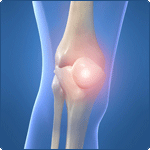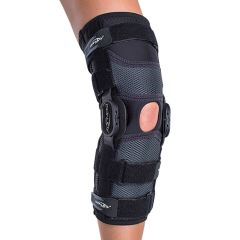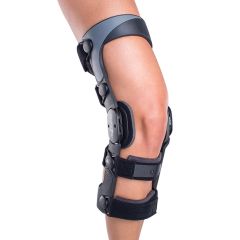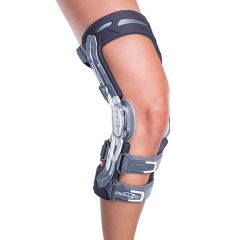LCL (Lateral Collateral Ligament) Tear

What is It?
The LCL also known as the Lateral Collateral Ligament is one of the four major ligaments that helps stabilize the knee joint when performing movement with the leg. It connects the femur (thigh bone) to the tibia (shin bone) along the outside of the knee and prevents that part of the knee joint from opening or gapping. An LCL injury can be a stretch, partial tear, or complete tear of the lateral collateral ligament.
What Causes an LCL Tear or Injury?
Typically the LCL is injured when there is direct force on the inside of the knee - the part closest to your other leg. This can cause the LCL, which is located on the outside of the knee, to be stretch or torn beyond its normal range of motion. Tears to the LCL are often seen during knee dislocations. Luckily LCL injuries are far less common than tears to other ligaments in the knee.
What are the Symptoms?
The symptoms of an LCL injury are similar to other ligament injuries. You may experience pain and tenderness along the outside of the knee, along with swelling. Some people also describe a feeling of instability in their knee when walking, as if the knee may give out, lock or catch. Your knee may feel stiff and be swollen. To confirm the diagnosis of an LCL injury, consult your physician. He or she will be be able to assess your knee in person and check on the range of motion. They may also ask you questions to help diagnose your injury.
Commonly Asked Questions for Diagnosis
- Did you get hit or contacted when you were injured?
- Did you hear a popping sound when you were injured?
- Did your knee swell up within the first few hours of the injury?
- Does your knee feel like giving out, catch or lock when you try to walk or stand?
What Can Be Done?
Immediate course of action after injuring your LCL is similar to other knee injures. Rest, ice, compress, and elevate also known as RICE. This should be done immediately after injury and continued within the first 24 to 48 hours of the injury to reduce pain and swelling. Any further activity should be stopped. Some patients may also use anti-inflammatory medications such as ibuprofen and aspirin to help with pain management and reduce inflammation.
Usually, surgery is not needed for an injured or torn LCL unless there have been injuries to other areas of the knee. Unlike the MCL, it is not connected to the meniscus, so meniscus tears are typically not seen in conjunction with LCL tears. While the LCL is recovering, a rigid hinged knee brace can be worn to provide extra stability and protection for the knee. Your doctor may also recommend a physical therapy program to help with rehabilitation.
What to Expect from Physical Therapy
Recovery time will vary based on the severity of the injury. Your physical therapist will help you reduce pain and swelling by recommending cold therapy. Use ice over the injured knee for 15-20 minutes 3-4 times a day. Overtime, your therapist will help you regain range of motion in the knee and rebuild strength and stability. Often times, when one suffers a knee injury, they also end up with muscle atrophy due to the limited use of their muscles on the injured leg. Your physical therapy routine will help you rebuild the surrounding muscles in your knee from your quads to your hips, glutes, and hamstrings. Along with strength building, you will work on increasing your range of motion through stretching and flexbility exercises.
When Can I Return to Activities or Sports?
Make sure that your doctor and physical therapist clears you for activity before you get back into motion. Use caution and start slowly and always warm-up and cool-down when you first begin activities after a ligament injury. Wear a knee brace to support your LCL to prevent further injury as your knee will be weaker than it previously was. Ice your knee after every activity to help it recovery more quickly.







